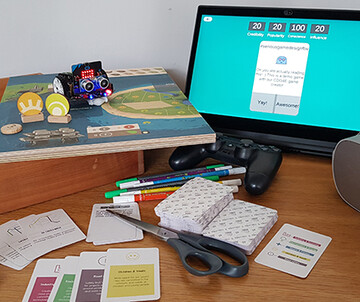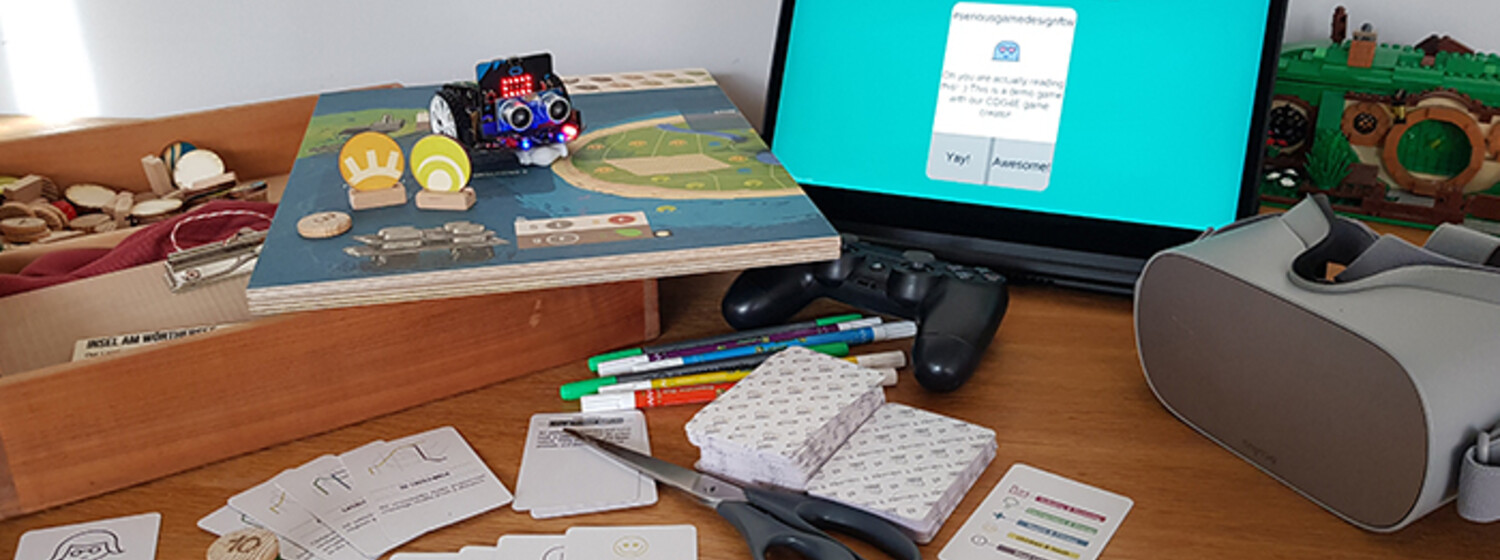26.03.2020 bis 26.03.2020 - MQ Raum D
Veranstalter: MQ Kulturmieter:innen
SUBOTRON arcademy: Challenge accepted!? Spotlights on Educational Game Design in Europe
FREIER EINTRITT, LITERATUR & DISKURS, FILM & DIGITALE KULTUR


The holy grail in education? A must-have of modern teaching? The biggest game design challenge?
Or too much of an effort?
Games have the potential to convey even complex topics, to stimulate reflection and open up various possibilities to make valuable (learning) experiences. For good reasons, they have received more and more attention in the educational sector in recent decades. However, only a few educational games found their way in everyday teaching practice and there are still many challenges to face.
The event highlights projects of different countries in Europe and invites to examine the topic of Games in Education from different perspectives. In short talks experts from France, Scotland, Germany and Austria give insights into their projects and key findings, followed by a panel discussion.
Program
18:30 – 19:00
welcome & registration
19:00 – 19:15
opening speech by Natalie Denk (Center for Applied Game Studies, Austria)
Create Digital Games for Education
19:15 – 19:30
George Kalmpourtzis (Infinitivity Design Labs, France)
How can game making help students develop their math skills?
19:30 – 19:45
Katharina Tillmanns (Cologne Game Lab, TH Köln, Germany)
Blending Realities: Learning with Mixed Reality Gaming
19:45 – 20:00
Stephen Reid (Immersive Minds, Scotland)
Game Changers: Using Games for Social Good
20:00 – 21:00
panel discussion
21:00
networking, food and drinks
Biographies
George Kalmpourtzis (Infinitivity Design Labs, France)
George Kalmpourtzis is an award-winning User Experience & Games Consultant and Educator. Finding himself between the fields of education, game studies and user experience, he has been founder, director and board member of several European design studios and consulting agencies. He has designed and produced numerous games (primarily for education) and conducted usability studies for a diverse portfolio of projects and contexts. George is currently helping design teams around the globe set-up their own creative processes and bring user-centred creative problem solving in the spotlight of design. George also holds bachelor’s degrees both in education and engineering, a master’s degree in information systems and a PhD in design pedagogy.
Katharina Tillmanns (Cologne Game Lab, TH Köln, Germany)
Katharina Tillmanns is a researcher, designer and lecturer for interactive media at the Cologne Game Lab, an Institute for Game Development and Research at TH Koeln (University of Applied Sciences). In her studies and work, she is exploring and promoting the expressive qualities of games as a means of art and activism. A former co-president and founding member of the Games for Change Europe network, Katharina has been involved as project lead for a multitude of r&d projects on communal, federal and european level. She is currently focussing on her dissertation research on multi-sensual learning in the context of mixed reality environments. Further research interests include: Aesthetic approaches in the field of interactive documentary storytelling, game-based learning, transformation game design, player psychology, collaborative learning, behavioral economics, artistic interventions.
Stephen Reid (Immersive Minds, Scotland)
Stephen a passionate advocate of both play as a powerful learning mechanism, and technology as a tool for learning. He actively pioneered much of the work that has led to what is now widely recognized as the field of games-based learning, starting one of the world’s first
games-based learning companies and now considered a leader in this global field. He has spent much of his career researching, developing and refining curriculum content and pedagogical practices that transform learning for students and teachers worldwide. He travels extensively, working in over 60 countries on five continents. Stephen believes in the complete democratization and decolonization of learning and that all learning should be a unique, relevant and meaningful experience, so designing lessons that draw students and teachers into environments with experiences that take place on farms and in museums, to travelling classrooms in shipping containers, as well as building an entire school using a single 3D printer in a South African township.
Natalie Denk (Center for Applied Game Studies, Austria)
Natalie Denk has a degree in Educational Science and Game Studies. Her research focuses on Game-based Learning, Educational Game Design and the examination of age and gender aspects in relation to digital games. Since 2014 she has been working on several national and international research projects at the Center for Applied Game Studies at the Danube University Krems. Furthermore, she is involved in the teaching as well as in the course management of the Master’s courses “Game Studies”, “Media Game Pedagogy”, “Action Oriented Media Pedagogy” and “Game-based Media & Education”. Since July 2018 she acts as Head of the Center.
Die Veranstaltungsreihe wird durch die Kulturabteilung der Stadt Wien und die Bundesstelle für die Positivprädikatisierung von digitalen Spielen im Bundesministerium für Arbeit, Familie und Jugend (BuPP.at) gefördert.
Mit freundlicher Unterstützung der Wirtschaftsagentur Wien.